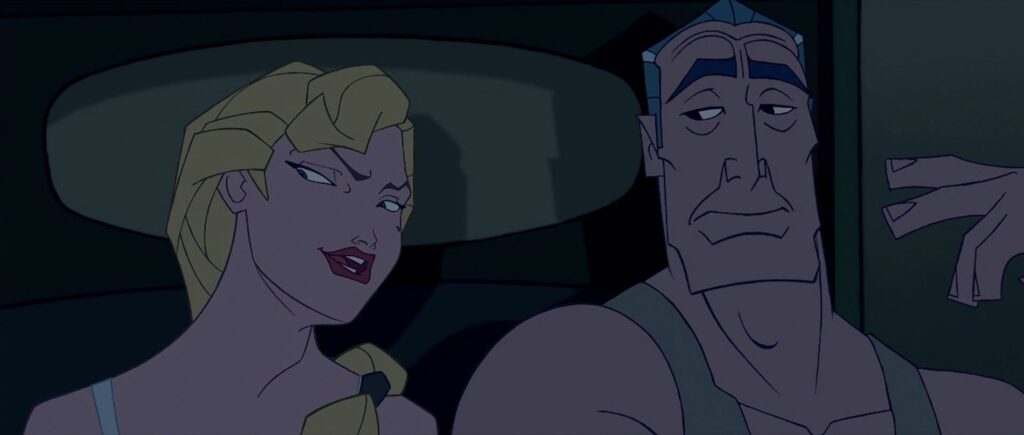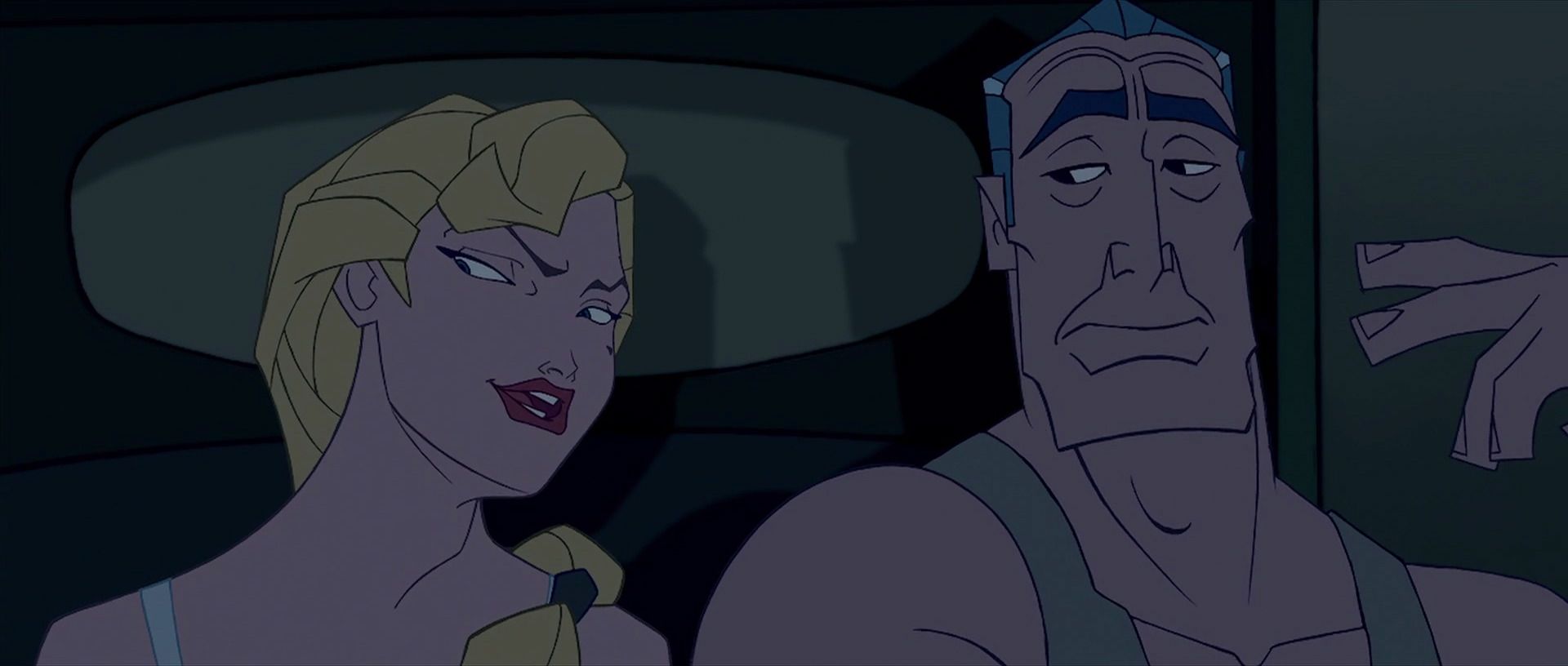
Atlantis: Unearthing the Disney Magic and Helga’s Intriguing Role
Disney’s Atlantis: The Lost Empire remains a fascinating, albeit somewhat underappreciated, entry in the studio’s animated canon. Released in 2001, it diverges from the typical Disney fairytale formula, offering a steampunk-infused adventure with a compelling narrative and a diverse cast of characters. Among these characters, Helga Sinclair stands out as a complex and morally ambiguous figure, adding depth and intrigue to the overall story of Atlantis. This article delves into the film’s enduring appeal, exploring its unique visual style, its departure from Disney tradition, and the significance of Helga‘s role in shaping the narrative.
A Departure from the Disney Norm
Atlantis: The Lost Empire distinguishes itself from other Disney animated features in several key aspects. Visually, the film is heavily influenced by the work of comic book artist Mike Mignola, creator of Hellboy. This influence is evident in the characters’ angular designs and the film’s overall art deco aesthetic. The animation style is more streamlined and less traditionally ‘Disney’ than films like The Little Mermaid or Beauty and the Beast. This deliberate stylistic choice contributes to the film’s unique identity and sets it apart from its predecessors.
Narratively, Atlantis adopts a more mature and action-oriented approach. It draws inspiration from classic adventure stories like Jules Verne’s Twenty Thousand Leagues Under the Sea and H. Rider Haggard’s King Solomon’s Mines. The story centers around Milo Thatch, a linguist and cartographer obsessed with finding the lost city of Atlantis. He joins an expedition funded by a wealthy eccentric, Mr. Whitmore, and embarks on a perilous journey to uncover the truth behind the legendary civilization.
Helga Sinclair: A Study in Ambiguity
Helga Sinclair is the second-in-command to Commander Rourke, the leader of the expedition. She is portrayed as a highly skilled and ruthless mercenary, fiercely loyal to Rourke and dedicated to completing their mission, regardless of the cost. Helga‘s character is notable for her lack of sentimentality and her unwavering commitment to her job. She is a pragmatist who sees the world in terms of profit and loss, and she is willing to make difficult decisions to achieve her goals.
Helga‘s motivations are not explicitly explored in the film, but it is implied that she is driven by a desire for wealth and power. She sees the discovery of Atlantis as an opportunity to amass a fortune, and she is prepared to do whatever it takes to secure her share of the spoils. This ambition makes her a complex and morally ambiguous character, blurring the lines between hero and villain. While she is clearly an antagonist, she is not entirely unsympathetic. Her loyalty to Rourke and her competence in her role make her a formidable opponent, and her ultimate fate adds a layer of tragedy to her character arc.
Helga’s Role in the Narrative
Helga‘s role in the narrative is crucial to the film’s overall themes. She represents the darker side of human ambition and the dangers of unchecked greed. Her willingness to exploit the Atlanteans for personal gain highlights the potential for corruption and the importance of ethical considerations in exploration and discovery. Helga‘s actions serve as a cautionary tale, reminding viewers of the responsibility that comes with power and the potential consequences of prioritizing profit over principle.
Her relationship with Commander Rourke is also significant. While she is fiercely loyal to him, their dynamic is ultimately one of exploitation. Rourke uses Helga‘s skills and ruthlessness to further his own agenda, and he is ultimately willing to sacrifice her to achieve his goals. This highlights the dangers of blind loyalty and the importance of questioning authority, even when it comes from someone you trust.
The Enduring Appeal of Atlantis
Despite not achieving the same level of commercial success as some of Disney’s other animated films, Atlantis: The Lost Empire has garnered a dedicated following over the years. Its unique visual style, its mature themes, and its compelling characters have resonated with audiences who appreciate its departure from the traditional Disney formula. The film’s exploration of themes such as colonialism, environmentalism, and the importance of cultural preservation continues to be relevant today.
The film’s steampunk aesthetic also contributes to its enduring appeal. The combination of Victorian-era technology and futuristic elements creates a visually stunning and imaginative world. The intricate designs of the Atlantean machines and the exploration vehicles are a testament to the film’s attention to detail and its commitment to creating a believable and immersive environment. The visual details of Atlantis itself are mesmerizing and contribute to the overall sense of wonder.
Furthermore, the film’s diverse cast of characters adds to its appeal. In addition to Milo and Helga, the expedition team includes a variety of individuals from different backgrounds and with different skills. This diversity reflects the film’s message of unity and the importance of collaboration in achieving a common goal. The characters’ interactions are often humorous and heartwarming, adding a layer of levity to the film’s more serious themes. The portrayal of Helga adds a layer of complexity to the team dynamic.
Atlantis Today
In recent years, there has been renewed interest in Atlantis: The Lost Empire. Fans have praised the film’s unique qualities and have argued that it deserves more recognition as a significant contribution to the Disney animated canon. The film’s themes and characters continue to be discussed and analyzed, and its visual style continues to inspire artists and designers.
While there are no current plans for a sequel or a reboot, the possibility remains that Atlantis could one day return to the big screen. In the meantime, the film continues to be enjoyed by audiences of all ages, and its legacy as a unique and innovative animated adventure remains secure. The impact of characters like Helga further solidify the film’s place in Disney history.
Conclusion
Atlantis: The Lost Empire is a testament to Disney’s willingness to experiment and push the boundaries of animated storytelling. Its unique visual style, its mature themes, and its compelling characters make it a film that continues to resonate with audiences today. Helga Sinclair, with her complex motivations and ambiguous morality, stands out as a particularly memorable character, adding depth and intrigue to the overall narrative. The film’s enduring appeal lies in its ability to transport viewers to a fantastical world while also exploring important and relevant themes. The legacy of Atlantis and the role of Helga within it, are sure to be discussed for years to come, making it a unique and important contribution to Disney’s animated filmography. The story of Atlantis, the characters, and the animation style, all contribute to the film’s lasting impact. The character of Helga, in particular, provides a fascinating look at ambition and loyalty. The film Atlantis remains a unique entry in the Disney catalog. The role of Helga adds to the film’s complexity. Disney’s Atlantis offered a fresh take on animated adventure. The character of Helga is a memorable one. Ultimately, Atlantis and its characters, including Helga, have left a lasting mark.
[See also: The Making of Atlantis: Behind the Scenes]
[See also: The Art of Mike Mignola: Influencing Atlantis]
[See also: Exploring Steampunk in Disney Animation]

